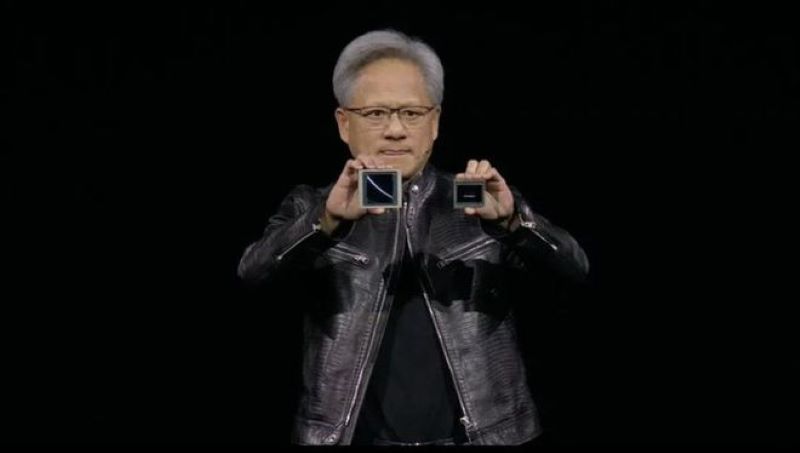Nvidia’s new generation AI chip Blackwell encountered server overheating problems when it was launched, causing delays in its delivery. This situation has made many customers worried that they will not be able to start new data centers in time, causing data center deployment plans to be postponed. This incident not only reflects the complexity and challenges of the latest technology in practical applications, but also reveals the pressure of competition and innovation in the AI chip market.
Blackwell AI Chip Overview
As an AI chip with extremely high computing performance, Blackwell is designed to optimize machine learning and deep learning tasks. It supports more efficient parallel computing and can perform well when processing complex data sets. This makes Blackwell a popular choice for applications in scientific research institutions and large enterprises, especially in scenarios where large-scale data analysis and deep learning model training are required. The performance improvement can significantly shorten processing time and improve overall productivity.
The Blackwell series of chips, especially the GB200, is the pinnacle of NVIDIA’s current technological level. This product is equipped with advanced Tensor Core, which can efficiently handle the computing needs of artificial intelligence and deep learning. However, Nvidia has encountered some challenges before during the production and design process. The market earlier broke the news that Blackwell’s design flaws led to a decrease in output and a delay in production progress. Nvidia even modified some of the GPU’s structural designs to improve production reliability.
Blackwell artificial intelligence chip was released in March this year. Nvidia’s official website states that it will “break the barriers of generative AI and accelerated computing” and bring “breakthrough progress”. It is said that Blackwell is used to train large language AI models and is 2.5 times faster than Nvidia’s previous generation chip H100. The chip was previously expected to ship in the second quarter of this year. However, with the emergence of server overheating issues, all this became less optimistic.

Impact of Overheating Issues
Initial tests found that Blackwell chips are prone to overheating when running under high loads. Blackwell GPUs can create overheating issues when used in servers with 72 processors, and these machines are expected to consume up to 120kw per rack. Overheating can limit GPU performance and risk damaging components. This phenomenon directly affects the design of supporting servers, leading to concerns about chip performance. Some customers said that they have faced pressure from project delays and are unable to implement Blackwell-based AI solutions as scheduled. This situation is undoubtedly a heavy blow to companies in urgent need of transformation.
Overheating problems will not only cause chip performance to decrease, but may also cause safety hazards such as equipment failure and even fires. Therefore, for data centers, this is an issue that cannot be ignored. For data center operators, cooling issues not only affect the deployment of new hardware, but also affect the management process to a greater extent. If the server runs at high temperatures for a long time, it will cause hardware damage and increase operating costs. As a result, customers are concerned that their inability to safely and effectively run systems containing Blackwell within the established time frame will negatively impact their business decisions and market competitiveness.
In previous product releases, Nvidia has won a good reputation for the efficient performance of its AI hardware. But now, if these cooling issues cannot be resolved quickly, companies must risk losing customers due to delayed deliveries. This is not only about the technology itself, but also a test of Nvidia’s continued leadership in the AI hardware market.
Nvidia’s Response
Faced with this challenge, NVIDIA acted quickly. First, the company has strengthened communication with customers, promptly reported progress, and promised to resolve the problem as soon as possible. Secondly, NVIDIA’s technical team is continuously conducting technical research to find effective cooling solutions. In addition, the company also plans to launch a series of compensation measures to mitigate customers’ losses. Nvidia responded that Nvidia is working with leading cloud service providers as an integral part of Nvidia’s engineering team and processes. Engineering iterations are normal and expected. Integrating the GB200, the most advanced system to date, into a variety of data center environments requires co-engineering with NVIDIA customers.
Competitive Situation of AI Chip Market
In the field of AI chips, Nvidia is not the only player. Companies such as AMD and Google have also launched their own AI hardware solutions and are competing for innovation in performance and energy efficiency. The market’s expectations for chips are not limited to computing power, but also focus on reliability and stability in practical applications. Blackwell’s performance in this area will directly affect Nvidia’s market share in the next few years. The outcome of this competition may not depend solely on the improvement of technical indicators, but also on how to solve practical problems such as overheating.
In addition to the problems of the hardware itself, this incident also triggered the industry’s thinking on AI hardware design. With the rapid development of artificial intelligence technology, users have higher and higher requirements for the durability and stability of chips. The development of innovative tools such as AI painting and AI writing has made competition in this field increasingly fierce. Hardware manufacturers must ensure product reliability while improving performance to meet the growing market demand.
When users use new-generation AI tools, they often hope to be able to seamlessly integrate new hardware instead of encountering bottlenecks in their application process. Therefore, how to balance product performance and heat dissipation capabilities has become a problem that technology developers need to focus on. Nvidia said that they will solve the overheating problem of the Blackwell chip as soon as possible and plan to release an upgraded version next year to improve the overall performance of the chip.
At the same time, the industry generally believes that the future development trend of AI hardware will pay more attention to the innovation of heat dissipation technology. In the context of the rapid promotion of applications such as AI painting and AI writing, the increase in related demand will also push chip manufacturers to make technological breakthroughs. For example, emerging technologies such as liquid cooling technology and intelligent heat dissipation management systems will play an important role in future hardware design, providing users with more robust performance guarantees.











